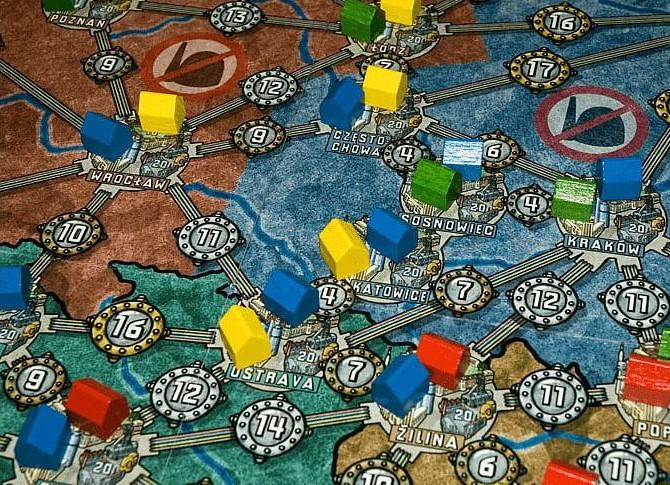Board Game Mechanics – Compensation Auction
Compensation auction is a mechanic used in some board games where players bid on items or actions using a combination of resources and victory points. Players take turns making offers for the item or action being auctioned, and other players can either accept the offer or make a counter-offer. The winner of the auction is the player who makes the highest offer, and they must pay the resources and/or victory points to the bank in exchange for the item or action.
The compensation auction mechanic creates a strategic element as players must consider the value of the item or action being auctioned and weigh the costs of bidding against their current resources and future victory point potential. It also allows players to potentially gain a valuable item or action while compensating the other players with resources or points they can use to improve their own position in the game.
Compensation auction is a key element of many auction-style board games and is known for creating a dynamic and interactive experience for players.
Here are 10 popular board games with the compensation auction mechanic and a brief description of each:
- Power Grid – In Power Grid, players bid on power plants to power their networks of cities. The compensation auction mechanic is used when a player passes on a power plant during the auction phase. That player is compensated with money equal to the number of players who bid on that power plant.
- Puerto Rico – In Puerto Rico, players bid on roles that allow them to take certain actions. The compensation auction mechanic is used when a player passes on a role during the selection phase. That player is compensated with a doubloon (a type of currency in the game).
- Princes of Florence – In Princes of Florence, players bid on various types of cards that allow them to build structures and gain points. The compensation auction mechanic is used when a player passes on a card during the auction phase. That player is compensated with money.
- Container – In Container, players bid on different types of containers that they will use to transport goods. The compensation auction mechanic is used when a player passes on a container during the auction phase. That player is compensated with money.
- Brass: Birmingham – In Brass: Birmingham, players bid on industry cards that allow them to build various types of businesses. The compensation auction mechanic is used when a player passes on an industry card during the auction phase. That player is compensated with money.
- Archipelago – In Archipelago, players bid on various types of tiles that they will use to build their settlements. The compensation auction mechanic is used when a player passes on a tile during the auction phase. That player is compensated with a resource.
- Trajan – In Trajan, players bid on various types of actions that allow them to perform different actions on the board. The compensation auction mechanic is used when a player passes on an action during the selection phase. That player is compensated with a victory point.
- Antiquity – In Antiquity, players bid on various types of resources that they will use to build their civilizations. The compensation auction mechanic is used when a player passes on a resource during the auction phase. That player is compensated with a resource.
- Hansa Teutonica – In Hansa Teutonica, players bid on various types of actions that allow them to build their trade networks. The compensation auction mechanic is used when a player passes on an action during the selection phase. That player is compensated with a trading post.
- Homesteaders – In Homesteaders, players bid on various types of buildings that they will use to build their homesteads. The compensation auction mechanic is used when a player passes on a building during the auction phase. That player is compensated with money.
A specific example of the compensation auction mechanic can be found in the popular board game Power Grid. In Power Grid, players take on the role of energy companies competing to supply electricity to cities.
Bidding: At the start of each round, players take turns bidding on power plants that are up for auction. The power plants provide a source of energy and also determine the order in which players take turns in future rounds.
Offers: On a player’s turn, they can either make an offer for a power plant or pass. Offers consist of a combination of money and one or more power plants that the player already owns. The player making the offer must also specify how many power plants they are willing to give up, if any.
Counter-Offers: After a player makes an offer, other players have the opportunity to make counter-offers. Counter-offers must be higher than the previous offer, both in terms of money and the number of power plants being offered.
Winning the Auction: The player who makes the highest offer wins the auction and takes possession of the power plant. They must pay the amount of money specified in their offer and give up the specified number of power plants to the bank.
End of the Round: The auction continues until all power plants have been auctioned. At the end of the round, players use the power plants they own to supply energy to cities and earn money.
This example shows how the compensation auction mechanic works in Power Grid. The ability to bid on power plants using a combination of money and power plants creates a strategic element as players must balance their resources and consider the future value of the power plant. The auction process also creates a competitive atmosphere as players compete to win the power plant they want.

